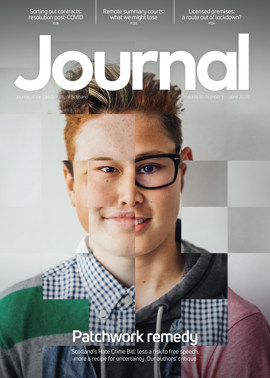See Me, see everyone
 As part of our Lawscot Wellbeing work, in 2019 we collaborated with See Me on a survey to give us benchmark data on the status of mental health stigma and discrimination in the legal profession. We have published the findings together with a new three-year action plan which lays out how we will work with the profession to address the main issues.
As part of our Lawscot Wellbeing work, in 2019 we collaborated with See Me on a survey to give us benchmark data on the status of mental health stigma and discrimination in the legal profession. We have published the findings together with a new three-year action plan which lays out how we will work with the profession to address the main issues.
The survey, the first of its kind carried out on a sector-wide basis in Scotland, generated an excellent response. It explored themes such as attitudes and perceptions in the workplace, access to training, forms of support like reasonable adjustments, and assessing how effectively managers support their teams’ mental health needs.
From the results, based on See Me’s analysis of 1,242 responses, it is encouraging to find that over three-quarters of respondents (77%) want to have a better understanding of mental health problems to help them provide support, indicating a desire for training to develop confidence and skills at all levels. Respondents felt training could have a major impact on workplace culture, 62% citing training for managers and 54% training for colleagues.
There is, however, a perceived gap in manager confidence and skillsets. Only a quarter of respondents (24%) thought supervisors or line managers knew how to support staff in relation to mental health and wellbeing; 39% believed line managers understood and adopted reasonable adjustment. See Me have indicated to us that improvement in this area would make the biggest difference to workplace culture.
Another main area of focus is having conversations around mental health, including what is needed to maintain good mental health as well as being able to disclose conditions at work. Despite growing awareness, the survey highlights the need for further work to ensure that solicitors and others in the sector feel comfortable in raising issues about their mental health or discussing reasonable adjustments.
The survey found that:
- 47% felt confident about holding a conversation about reasonable adjustments;
- 46% believed opportunities for staff to have open and honest conversations about mental health would create a more positive attitude;
- 39% of respondents felt senior leaders in their organisation showed their commitment to staff mental health.
Enabling conversations will be critical to breaking down the stigma. It is a concern that 24% of respondents had observed or were aware of stigmatising attitudes to mental health, while 23% also said they had observed or were aware of discrimination within their own organisations. Over a third (37%) would not want to speak about their mental health in work for fear of the reaction they would receive from colleagues, and 45% from fear of manager reaction; 31% felt it could impact their career prospects.
Since we launched Lawscot Wellbeing in 2018, we have run various events and campaigns to ensure mental health remains at the top of our agenda. The interest in our events during Mental Health Awareness Week 2020 is testament to the legal profession taking an active role in developing their knowledge of key issues. We ran various sessions in collaboration with Clio, from how being a lawyer can impact mental health, to building resilience in the context of career building. Three hour-long webinars are now available on our website to catch up on: see under “Recorded webinars” in the CPD and training section of the Society’s website.
The action plan sets out a seven-step framework for how we will develop our work with Lawscot Wellbeing, to take a targeted approach. Our priorities include engaging with employers and the wider profession to create a more open culture, promoting mental health engagement and awareness. We will also develop the existing resources in Lawscot Wellbeing to provide a one-stop shop for anyone looking for information and support for themselves or others.
Working in law can be stressful: long hours and a heavy workload can take a toll on both physical and mental health. The survey findings emphasise the need to drive change – and, while our current circumstances could never have been predicted when we launched the survey, it is potentially even more important in light of the challenges COVID-19 presents for all of us.
Our action plan commits us to tackling stigma and discrimination in the profession, to changing workplace culture, promoting open conversation and providing the right support. In three years, we will conduct a further survey to monitor progress, with the long term objective of ensuring that everyone working in the sector can speak out about how they are feeling and seek support without worrying about potential stigma or discrimination at work.
About the survey
Open during May and June 2019, the online survey sought to gather attitudes and perceptions of solicitors, trainees, paralegals, legal technicians and all support staff working in practice units and in-house legal teams regarding mental health stigma and discrimination within the sector. See Me, Scotland’s programme to end mental health stigma and discrimination, gathered and analysed the anonymous data. The full report is available on the Society’s website at bit.ly/LSSmentalhealth.






